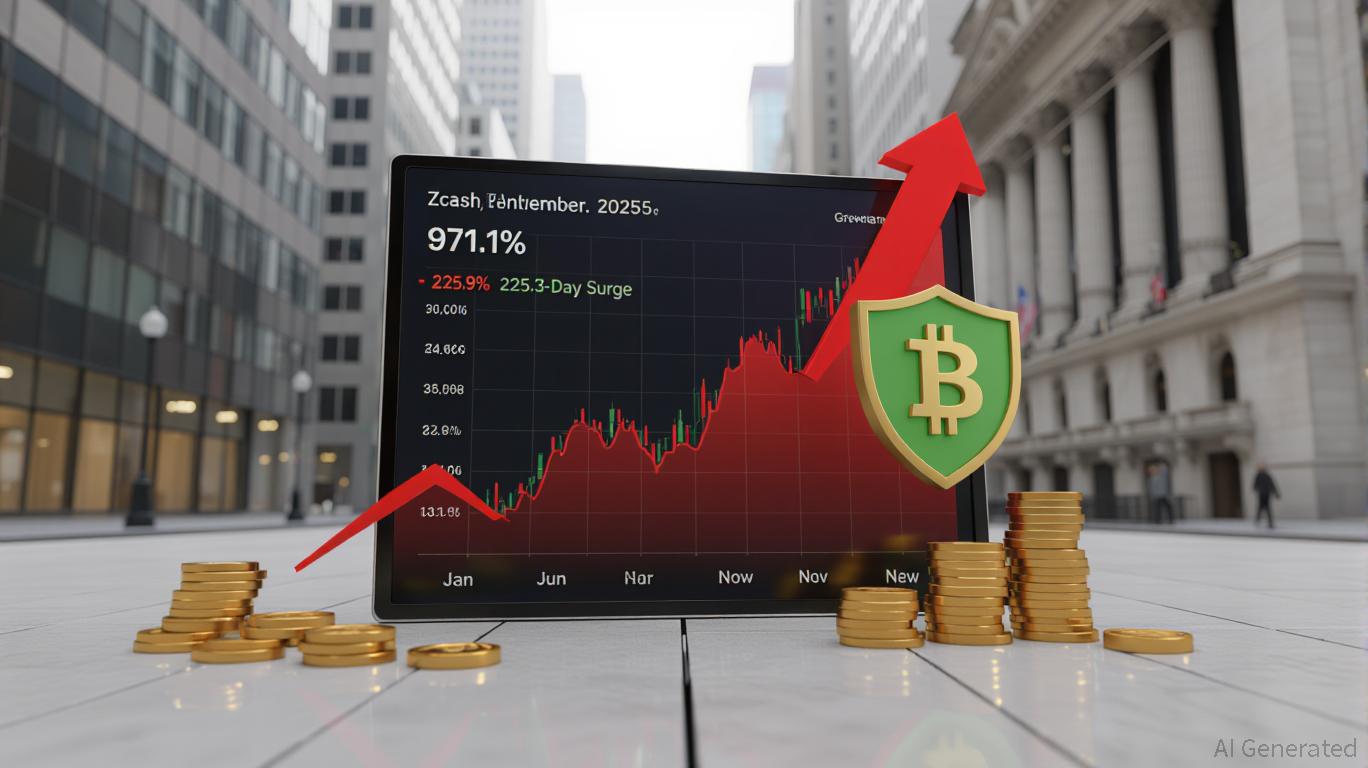Zcash (ZEC) Price Rally: Could This Signal a New Era for Privacy Coins?
- Zcash (ZEC) surged 971.1% in 2025, reaching $409, driven by technical upgrades, regulatory shifts, and institutional adoption. - Privacy coins' market cap rose 80%, with Zcash and Dash hitting multi-year highs amid stricter global regulations. - Grayscale's $85M Zcash Trust and innovations like shielded transactions highlight privacy as a premium asset in crypto. - Regulatory challenges persist, but 73% of privacy coin users prioritize anonymity, with 24% of new wallets institutional. - Zcash's flexibili
In 2025, the cryptocurrency landscape has experienced a dramatic transformation in investor attitudes, with privacy-oriented coins such as
Key Catalysts: Privacy Gains New Value
Zcash’s price jump has occurred alongside a broader shift in the market toward privacy-driven digital assets. By early November 2025, the total market value of privacy coins had climbed by nearly 80%, with both Zcash and
Both individual and institutional investors are increasingly valuing privacy. More than 61% of privacy coin holders cite financial confidentiality as their main reason for investing, and in 2025, 24% of new privacy coin wallets were opened by institutions, according to CoinLaw. Zcash’s distinctive feature—supporting both transparent and shielded transactions—has made it stand out compared to alternatives like Monero (XMR), which lacks this dual capability, as mentioned in a

Institutional Momentum: Merging Privacy with Regulation
The pace of institutional involvement with Zcash accelerated in the fourth quarter of 2025, highlighted by the debut of the Grayscale Zcash Trust, which invested $85 million in
- Ephemeral addresses for swaps using the NEAR Intents protocol, boosting privacy for transactions, as described in a
- Pay-to-Script-Hash (P2SH) multisig support for Keystone hardware wallets, enhancing security, as reported in a
- Decentralized entry and exit points (such as "Swaps") to simplify shielded ZEC transactions, as outlined in the
These advancements have led to shielded transactions making up 20–25% of all circulating ZEC and 30% of total transactions, according to a
Regulatory Hurdles and Market Dynamics
Despite its strong performance, Zcash still faces significant obstacles. The cost of compliance for privacy-focused companies has increased by 35% year-over-year, now averaging $1.2 million annually, according to CoinLaw. Monero’s refusal to implement optional traceability features has further highlighted the ongoing conflict between privacy and regulatory approval, as reported by CoinLaw. Nevertheless, data shows that only 7% of global privacy coin transactions are suspected of being linked to illegal activity, challenging the perception that these assets are mainly used for crime, as noted by CoinLaw.
The success of the Grayscale Zcash Trust demonstrates that institutional investors are prepared to navigate these regulatory complexities. Zcash’s adaptability—enabling users to select between privacy and transparency—could be crucial for balancing regulatory demands with practical use, as mentioned in a
Conclusion: Lasting Privacy Revolution or Temporary Surge?
The rapid rise in Zcash’s price and its growing institutional backing point to increasing recognition of privacy as a valuable feature in the digital asset space. Although regulatory challenges remain, the heightened desire for financial privacy—spurred by stricter compliance measures and a move toward privacy-first technologies—indicates that Zcash and similar coins are likely to remain relevant.
However, whether this “privacy renaissance” will endure depends on Zcash’s ability to keep innovating without sacrificing user experience. As Electric Coin Co. continues to advance its development plans, the next several months will reveal if Zcash can maintain its momentum or if this surge is simply a prelude to a broader market adjustment.
At present, the evidence is clear: Privacy has evolved from a niche interest to a fundamental value driver in the post-2025 cryptocurrency world.
Disclaimer: The content of this article solely reflects the author's opinion and does not represent the platform in any capacity. This article is not intended to serve as a reference for making investment decisions.
You may also like
Zcash Latest Updates: ZEC Risks $5.65M—Stacked Gains Face Liquidation Threat
- A trader generated $5.65M in ZEC unrealized profits via pyramiding, leveraging Zcash's 400% surge to $586. - The strategy reinvested gains to expand 55,000 ZEC positions, exploiting ZEC's shielded pool and ZK tech adoption. - Whale-driven 5x leverage and $16M long liquidations highlight risks, with $450 support critical to avoid cascading losses. - Diverging institutional/retail flows and overbought RSI signal fragility, urging caution amid bullish Fibonacci targets.
Supreme Court Could Limit Trump Tariffs, Strengthening Congress’s Role in Trade Policy
- U.S. Supreme Court may strike down Trump's emergency tariffs via 7-2 ruling, with conservative justices joining liberals to curb executive overreach. - Ruling would reinforce "major questions doctrine," requiring congressional approval for policies with vast economic impacts like trade measures. - Invalidating tariffs could trigger $90B refunds, strain federal budgets, and reshape congressional-executive power dynamics in economic governance.
Rivian offers RJ Scaringe a revised compensation plan valued at as much as $5 billion
Stellar News Today: Crypto Presales Ignite 100x Buzz While MoonBull Climbs, TON and XLM Falter
- MoonBull (MOONBULL) surges to $550K in presale, seen as potential 100x play by 2025, driven by DeFi and AI analytics. - Toncoin (TON) and Stellar (XLM) decline amid skepticism toward centralized ecosystems and stagnant utility differentiation. - BlockDAG raises $435M via DAG architecture to challenge Layer 1 scalability, while stablecoins reshape monetary policy frameworks. - Presale projects like MoonBull and LivLive attract speculative capital, signaling investor shift toward innovation over establishe
